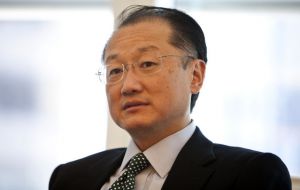MercoPress. South Atlantic News Agency
New World Bank president pledges to help emerging markets keep expanding
 The Korean/US citizen Jim Yong Kim is a physician by training
The Korean/US citizen Jim Yong Kim is a physician by training Jim Yong Kim, who took over as World Bank president said his first task will be to help emerging markets keep expanding at a time of stress for the world economy.
“We begin our work together at a crucial moment” as the global economy “remains vulnerable,” Kim wrote in an e-mail to the Washington-based bank’s staff. “My immediate priority will be to intensify the Bank Group’s efforts to help developing countries protect growth and jobs.”
The 52-year-old Kim, the former president of Dartmouth College, succeeds Robert Zoellick at the helm of a poverty- fighting institution that made loans worth almost 53 billion dollars last year. Kim, a physician by training, has little time to ease into a job that stretches beyond his expertise as global growth is threatened by the European debt crisis and a slowdown in China.
“This is about financial crisis management, macroeconomics, understanding the workings of the European monetary union and what the risks are and prioritizing countries” according to their needs, said Uri Dadush, director of international economics at the Carnegie Endowment for International Peace in Washington and a former World Bank director of economic policy.
“It’s not rocket science but it will be a new area for him, one in which he has no experience,” he said, predicting a “steep learning curve” for Kim.
Kim, a graduate of Harvard Medical School, breaks the mold of World Bank presidents, who have been drawn from government and finance.
The bank was created at the end of World War II to help rebuild ravaged Europe. Now focused on developing countries, it lends for everything from building roads to supporting education policies, and has expanded its scope to taking stakes in companies and guaranteeing investments.
Complicating Kim’s job, the bank’s financial power is now more constrained than four years ago after stepping up loans to emerging countries hit by the financial crisis.
“We went into the 2008 crisis with a big cushion of capital so we could expand in a way that we cannot just repeat today,” said Joachim von Amsberg, the bank’s vice president of operations policy and country services, in a June 26 interview. The bank’s equity-to-loans ratio for the unit that lends to governments fell last year to 29% from nearly 38% in 2008.
Commitments climbed during the crisis to a record 73 billion in the fiscal year 2010 from 38 billion just two years before, prompting the bank to seek a capital injection from member countries, which it obtained in April 2010.
The additional cash and a gradual decline in lending helped keep the bank’s equity-to-loans ratio just above its target range. Maintaining that level is important to keep its top credit rating, needed to raise money at low cost.
As a result, the bank is exploring ways to make the most of its resources, von Amsberg said. While demand for loans hasn’t yet increased, many countries are inquiring about precautionary financing, similar to the 1.3 billion Romania received last month, he said.
The bank in a June report predicted that developing countries should prepare for a long period of volatility in the global economy, cutting its outlook for 2013 global growth to 3%.




Top Comments
Disclaimer & comment rulesCommenting for this story is now closed.
If you have a Facebook account, become a fan and comment on our Facebook Page!